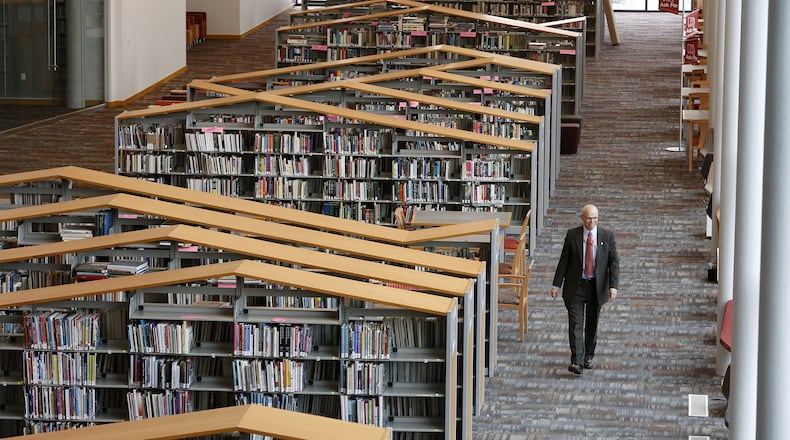“Tim has created a positive culture, provides thoughtful and strategic leadership, and is a trusted community collaborator,” Elaine Johnson, president of the Dayton Metro Library board of trustees, said in an announcement of Kambitsch’s retirement.
Always with enthusiasm for the task ahead, no matter if the project was as tedious as cataloging hundreds of thousands of books, “Kambitsch has guided the library through monumental change and growth,” Johnson said.
Credit: Contributed
Credit: Contributed
While a sophomore at what was then Chaminade High School, Kambitsch and some friends quit their paper routes in hopes of “making some real money.” His mother said he needed another job, and told him to head to the library. It was Aug. 9, 1972 that the future DML executive director got his first library job as a “page’ — a position that included sorting and shelving books and assisting patrons.
“I definitely think about my family growing up. We were a strong library family,” Kambitsch said. “We were such regular library users as a family that my dad talked one of the librarians into giving us a behind-the-scenes tour of the original Dayton library built in 1888.”
Though Kambitsch can’t recall that visit, he said his older brother Greg still teases about a very young Tim behaving “very fussy and problematic” on the tour.
When he was 6 or 7, Kambitsch’s family moved to a house on Wyoming Street that had an empty lot across the way. The parcel was owned by the library system, and it was the first time Kambitsch remembers being dazzled by the arrival of the “book-mobile” every couple of weeks.
“To be able to look out the window and say ‘Oh the bookmobile is here!’ and the excitement (surrounding) that., that’s probably one of my earliest personal experiences with the library,” Kambitsch said.
DML actually went on to build a library branch on that empty lot, and when it was time for the grand opening, Kambitsch’s mother was given the honor of cutting the celebratory cake. During the building of the East Branch, his mother brought water to the construction crew every single day.
Years later, coincidentally, it would be Kambitsch himself that had to make the difficult decision to close that East Branch during an effort to build newer, larger, more capable library facilities, rather than have many smaller facilities.
“I know she turned over in her grave … that I was the one who made that decision,” Kambitsch said. “But no, I’m certain she was probably quite proud of what we opened at the southeast branch up there next to Belmont High School.”
One of Kambitsch’s main contributions has been laying the groundwork to launch the major facilities plan for “Libraries for a Smarter Future.” The plan has been the driver behind construction of the new Main Library downtown and the building of 16 state-of-the-art branches throughout the Dayton area. The last four buildings are expected to open between late 2021 and early 2023.
Earlier in his career, in the 1980s, Kambitsch also implemented and managed DML’s first automated system. Before becoming the DML Information Technology Director in 1995, Kambitsch had a short stint in the private sector and then went on to manage an automation and network project that “introduced the Internet to library staff and the university community at Butler University Libraries,” according to the DML website.
“I often tell people my ego would benefit from sticking around for all the projects (to be completed) and see that the libraries are all in place,” Kambitsch said, “but the library doesn’t need me. … They’ll get done with these projects and they’ll finish them well without me. I have no worry about that whatsoever. I have the greatest confidence in them.”
Initially, Kambitsch was supposed to retire in March 2020, but extended his stay to see the library through the COVID-19 pandemic.
“When I talk about my outdoor adventures — those are the things that I really want to be able to do,” Kambitsch said. “And I know that as the years go by, my freedom to be able to do that because of this job” will likely fade.
Kambitsch is an avid outdoor recreation enthusiast, and has plans for great “bike-packing” adventures after retirement. The 65-year-old said he has no reason to think he won’t be around for the next 30 to 40 years.
“There will certainly be a Tim Kambitsch 2.0, but I’m not exactly certain what that is, and I’m not in a rush to find out what that is,” Kambitsch said. “I have no reason to want to slow down, and so I’m going to probably take most of the next six months to a year to figure out what that should be.”
A lifetime of being engaged with his Dayton community has helped fuel his hunger for adventure, Kambitsch said.
“There is something really special about being the head of an organization this size and in a community that I’ve had such a long story with,” Kambitsch said. “I’m so fortunate because it makes me so proud about the things that the library has done, because it’s about my community.”
Ahead of his departure, Kambitsch jokes that he might find himself at the library just as often in retirement. Contrary to what some would think, his home library is sparse, since he has had a vast collection of books at his fingertips his entire career.
“People want to know, people want to learn,” Kambitsch said. “People trust their library to do that. We have a great role and a position to provide equity in the community.
“Those are the things that have never really changed that much, even though that technology has changed. … There’s so many kids that, they learn to read in school and other locations, but it’s their library experience that perhaps gives them that love for reading. When you think about the kind of support this library has received, to do the kinds of things that they’ve given me the honor of doing, it’s because of those lifelong experiences.”
About the Author


